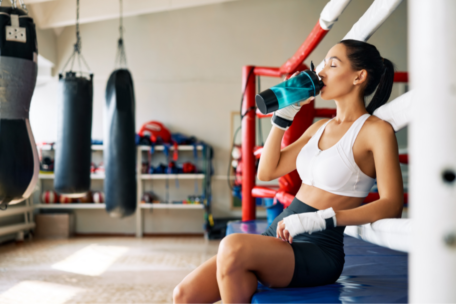 Hydration: The importance of drinking water as an athlete
Hydration: The importance of drinking water as an athlete
It’s well known that adequate hydration is essential for the body to function and thrive. When you’re an elite athlete, the need for hydration and ample fluid replacement is even more vital for both performance and general wellbeing.
Water intake is integral to support and maintain blood volume, regulate temperature, and allow for proper muscular function. When the body sweats through exercise, fluids are lost that need replacing to prevent heatstroke, decline in muscle function, poor performance, and dehydration.
Dehydration
When the body’s water content decreases, dehydration can occur. In the case you experience dehydration, there are several signs you should look out for, including:
- Headaches
- Fatigue
- Muscle cramping
- Dry lips
- Mood swings
When dehydrated, both mental and physical health can be impacted, in turn influencing athletic performance. It’s evident through studies that a loss of even 2% of fluid is enough to have a noticeable effect on decline in performance.
How can I calculate my fluid loss?
To better understand how much fluid you lose during exercise and how much you need to replenish the body, you can calculate your sweat rate.
Sweat rate can be determined by using this formula:
- Sweat rate (L/hr) = [Initial weight (kg) – Final weight (kg) + Fluid consumed during exercise (kg) – Urine (kg)]/Time (hrs)
To follow this formula, start by emptying your bladder and then weigh yourself just before you commence exercise. After your exercise session, note the quantity of fluid consumed throughout, estimate or measure urine output, and then weigh yourself again in the same clothing.
What should I drink for adequate hydration?
With a large volume of sports drinks that offer electrolyte support on the market, it’s important to be aware of what fluid is the most beneficial to rehydrate.
Water first and foremost is an effective option when needing to rehydrate. However, performance can be improved with the addition of carbohydrates and electrolytes to water. By consuming ample electrolytes, sodium levels are able to replenish after depletion throughout dehydration.
Some fluids that aren’t recommended include:
- Drinks that are high in carbohydrates and low in sodium like cordials, juices and soft drinks
- Caffeine (can act as a diuretic which can cause incremental fluid loss)
- Alcohol
If you want to learn more about your fluid replacement needs, we encourage you to consult your medical professional to implement a strategy that is targeted towards your specific needs.

